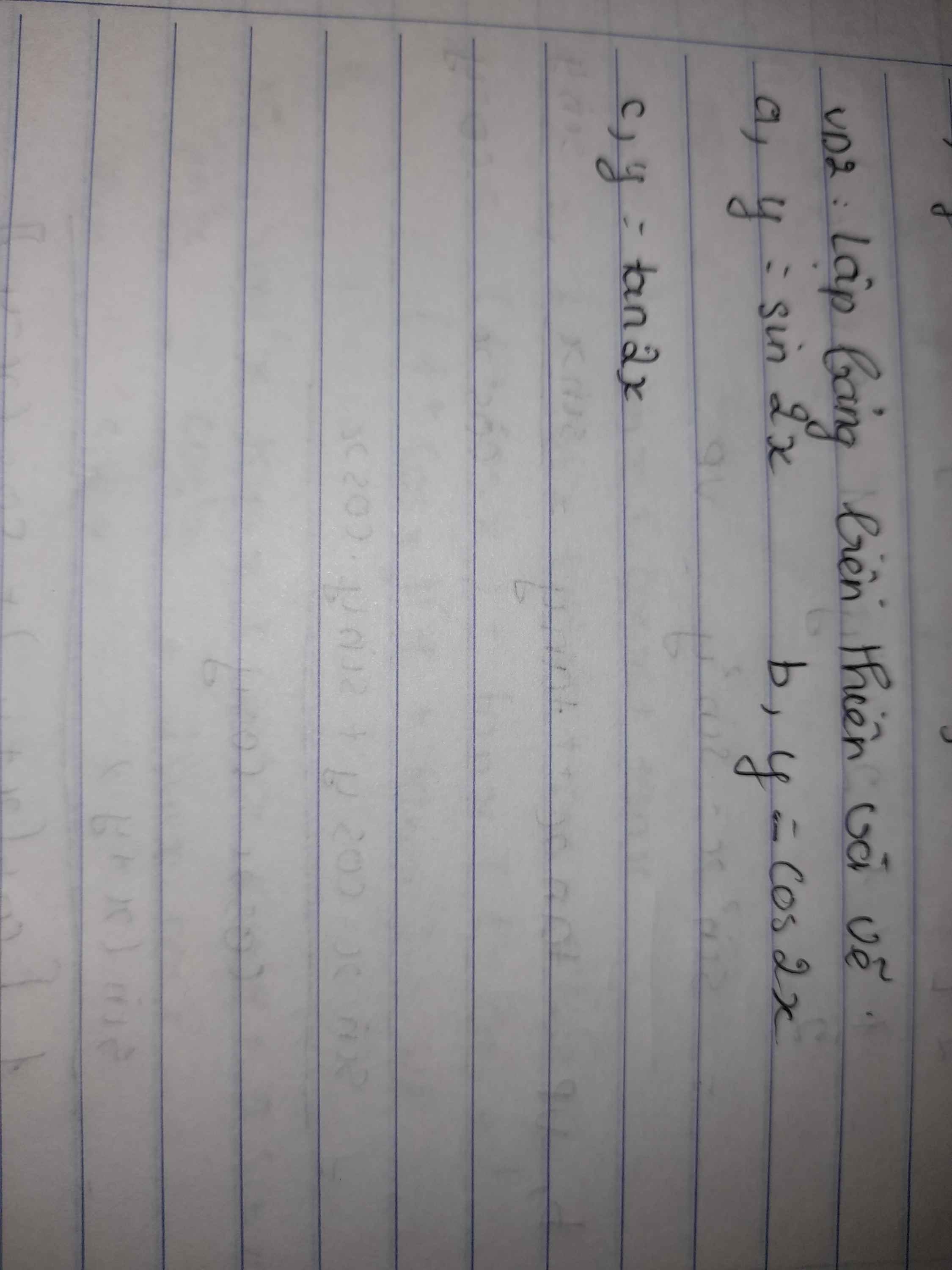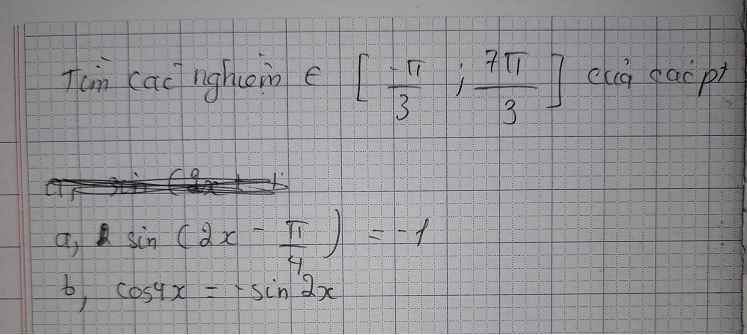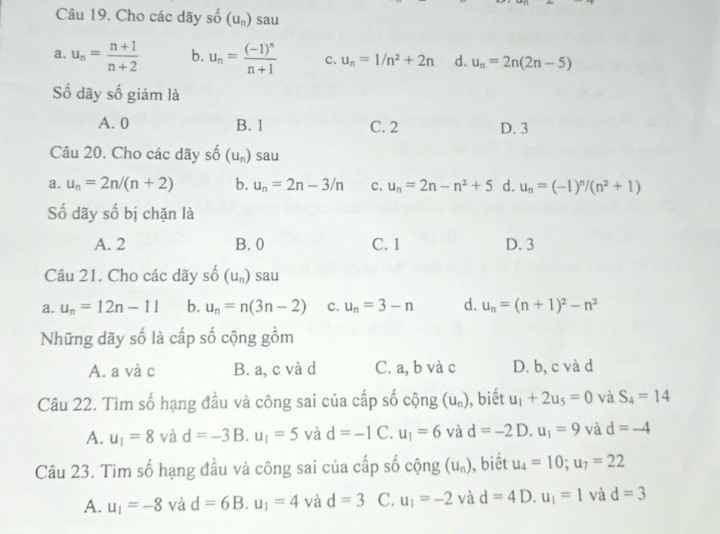
Hãy nhập câu hỏi của bạn vào đây, nếu là tài khoản VIP, bạn sẽ được ưu tiên trả lời.


a.
\(sin\left(2x-\dfrac{\pi}{4}\right)=-1\)
\(\Leftrightarrow2x-\dfrac{\pi}{4}=-\dfrac{\pi}{2}+k2\pi\)
\(\Leftrightarrow x=-\dfrac{\pi}{8}+k\pi\) (1)
\(-\dfrac{\pi}{3}\le x\le\dfrac{7\pi}{3}\Rightarrow-\dfrac{\pi}{3}\le-\dfrac{\pi}{8}+k\pi\le\dfrac{7\pi}{3}\)
\(\Rightarrow-\dfrac{5}{24}\le k\le\dfrac{59}{24}\Rightarrow k=\left\{0;1;2\right\}\)
Thế vào (1) \(\Rightarrow x=\left\{-\dfrac{\pi}{8};\dfrac{7\pi}{8};\dfrac{15\pi}{8}\right\}\)

5.
\(sin\left(60^o+2x\right)=-1\)
\(\Leftrightarrow60^o+2x=-90^o+k.360^o\)
\(\Leftrightarrow x=-75^o+k.180^o\)
6.
\(sin\left(2x+1\right)=\dfrac{1}{3}\)
\(\Leftrightarrow\left[{}\begin{matrix}2x+1=arcsin\dfrac{1}{3}+k2\pi\\2x+1=\pi-arcsin\dfrac{1}{3}+k2\pi\end{matrix}\right.\)
\(\Leftrightarrow\left[{}\begin{matrix}x=\dfrac{1}{2}arcsin\dfrac{1}{3}-\dfrac{1}{2}+k\pi\\x=\dfrac{\pi}{2}-\dfrac{1}{2}arcsin\dfrac{1}{3}-\dfrac{1}{2}+k\pi\end{matrix}\right.\)
Cách làm :
sina = \(\dfrac{1}{2}\) ⇔ \(\left[{}\begin{matrix}a=\dfrac{\pi}{6}+k2\pi\\a=\dfrac{5\pi}{6}+k2\pi\end{matrix}\right.\)
sina = \(-\dfrac{\sqrt{3}}{2}\) ⇔ \(\left[{}\begin{matrix}a=-\dfrac{\pi}{3}+k2\pi\\a=\dfrac{4\pi}{3}+k2\pi\end{matrix}\right.\)
sina = 1 ⇔ \(a=\dfrac{\pi}{2}+k.2\pi\)
sina = 0 ⇔ \(a=k\pi\)
sina = -1 ⇔ \(a=-\dfrac{\pi}{2}+k.2\pi\)
sina = \(\dfrac{1}{3}\) ⇔ \(\left[{}\begin{matrix}a=arcsin\left(\dfrac{1}{3}\right)+k2\pi\\a=\pi-arcsin\left(\dfrac{1}{3}\right)+k2\pi\end{matrix}\right.\)
Với a là một đa thức xác định trên R

23:
u4=10 và u7=22
=>\(\left\{{}\begin{matrix}u1+3d=10\\u1+6d=22\end{matrix}\right.\Leftrightarrow\left\{{}\begin{matrix}-3d=-12\\u1+3d=10\end{matrix}\right.\)
=>\(\left\{{}\begin{matrix}d=4\\u1=10-12=-2\end{matrix}\right.\)
=>Chọn C
Câu 22:
\(\left\{{}\begin{matrix}u1+2u5=0\\S_4=14\end{matrix}\right.\)
=>\(\left\{{}\begin{matrix}u1+2\left(u1+4d\right)=0\\4\cdot\dfrac{\left[2u1+3d\right]}{2}=14\end{matrix}\right.\)
=>\(\left\{{}\begin{matrix}3u1+8d=0\\2u1+3d=7\end{matrix}\right.\Leftrightarrow\left\{{}\begin{matrix}6u1+16d=0\\6u1+9d=21\end{matrix}\right.\)
=>\(\left\{{}\begin{matrix}7d=-21\\2u_1+3d=7\end{matrix}\right.\Leftrightarrow\left\{{}\begin{matrix}d=-3\\2u_1=7-3d=7+9=16\end{matrix}\right.\)
=>\(u_1=8;d=-3\)
=>Chọn A
21A
19B


Theo nguyên lý Dirichlet, nếu số chữ số 3 lớn hơn 5 thì luôn có ít nhất 2 chữ số 3 đứng cạnh nhau (ko thỏa mãn).
- Nếu ko có chữ số 3 nào: có đúng 1 số
- Nếu có 1 chữ số 3: xếp 9 chữ số 2 tạo ra 10 khe trống, có \(C_{10}^1\) cách đặt số 3 vào các khe trống đó \(\Rightarrow\) 10 số
- Nếu có 2 chữ số 3 (và 8 chữ số 2): xếp 8 chữ số 2 tạo thành 9 khe trống, xếp 2 chữ số 3 vào 9 khe trống đó: \(C_9^2=36\) số
- Nếu có 3 chữ số 3 và 7 chữ số 2: xếp 7 chữ số 2 tạo thành 8 khe trống, xếp 3 chữ số 3 vào 8 khe trống: \(C_8^3=...\)
Làm tương tự, nói chung kết quả sẽ là: \(C_{11}^0+C_{10}^1+C_9^2+C_8^3+C_7^4+C_6^5=...\)

a/
Nhận thấy \(cosx=0\) không phải nghiệm, chia 2 vế cho \(cos^2x\)
\(\Leftrightarrow3tan^2x+8tanx+8\sqrt{3}-9=0\)
\(\Leftrightarrow\left[{}\begin{matrix}tanx=-\sqrt{3}\\tanx=\frac{3\sqrt{3}-8}{3}\end{matrix}\right.\)
\(\Leftrightarrow\left[{}\begin{matrix}x=-\frac{\pi}{3}+k\pi\\x=arctan\left(\frac{3\sqrt{3}-8}{3}\right)+k\pi\end{matrix}\right.\)
b/
Nhận thấy \(cosx=0\) ko phải nghiệm, chia 2 vế cho \(cos^2x\)
\(tan^2x+2tanx-2=\frac{1}{2}\left(1+tan^2x\right)\)
\(\Leftrightarrow tan^2x+4tanx-5=0\Rightarrow\left[{}\begin{matrix}tanx=1\\tanx=-5\end{matrix}\right.\)
\(\Leftrightarrow\left[{}\begin{matrix}x=\frac{\pi}{4}+k\pi\\x=arctan\left(-5\right)+k\pi\end{matrix}\right.\)
c/
\(\Leftrightarrow\left(sinx+1\right)\left(1-2sin^2x-1\right)=0\)
\(\Leftrightarrow sin^2x\left(sinx+1\right)=0\Leftrightarrow\left[{}\begin{matrix}sinx=0\\sinx=-1\end{matrix}\right.\)
\(\Leftrightarrow\left[{}\begin{matrix}x=k\pi\\x=-\frac{\pi}{2}+k2\pi\end{matrix}\right.\)

4*cos(pi/6-a)*sin(pi/3-a)
=4*(cospi/6*cosa+sinpi/6*sina)*(sinpi/3*cosa-sina*cospi/3)
=4*(căn 3/2*cosa+1/2*sina)*(căn 3/2*cosa-1/2*sina)
=4*(3/4*cos^2a-1/4*sin^2a)
=3cos^2a-sin^2a
=3(1-sin^2a)-sin^2a
=3-4sin^2a
=>m=3; n=-4
m^2-n^2=-7





